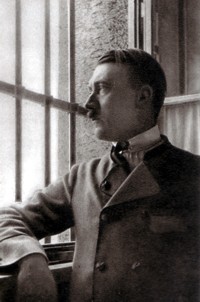 Up to November 1923 Hitler continued to build up the strength of the Nazi Party. During this time he also plotted to overthrow the German Weimar Republic by force. On November 8th 1923 Hitler led an attempt to take over the local Bavarian Government in Munich in an action that became known as the "Beer Hall Putsch." Despite initially kidnapping the Bavarian officials in the Buergerbraukeller beer hall in Munich and proclaiming a new regime using their names, the coup was not successful. The officials were allowed to escape and re-gain control of the police and the armed forces. The coup was ended on the morning of November 9th, when a column of three thousand SA men headed by Hitler and General Ludendorff (one of the most senior generals of the First World War) were halted on their way to the centre of Munich by armed police. After a brief gunfight, only General Ludendorff and his aide had made it through to the central Plaza, where they were arrested. Hitler had fled the scene and was later arrested and charged with treason. After his trial for treason he was sentenced to five years in Landsberg prison, however he had successfully used the trial itself to gain publicity for himself and his ideas. During his term in prison Hitler began dictating his thoughts and philosophies to Rudolf Hess which became the book "Mein Kampf" (My Struggle).
Up to November 1923 Hitler continued to build up the strength of the Nazi Party. During this time he also plotted to overthrow the German Weimar Republic by force. On November 8th 1923 Hitler led an attempt to take over the local Bavarian Government in Munich in an action that became known as the "Beer Hall Putsch." Despite initially kidnapping the Bavarian officials in the Buergerbraukeller beer hall in Munich and proclaiming a new regime using their names, the coup was not successful. The officials were allowed to escape and re-gain control of the police and the armed forces. The coup was ended on the morning of November 9th, when a column of three thousand SA men headed by Hitler and General Ludendorff (one of the most senior generals of the First World War) were halted on their way to the centre of Munich by armed police. After a brief gunfight, only General Ludendorff and his aide had made it through to the central Plaza, where they were arrested. Hitler had fled the scene and was later arrested and charged with treason. After his trial for treason he was sentenced to five years in Landsberg prison, however he had successfully used the trial itself to gain publicity for himself and his ideas. During his term in prison Hitler began dictating his thoughts and philosophies to Rudolf Hess which became the book "Mein Kampf" (My Struggle).
Adolf Hitler Biography
The Beer Hall Putsch - 1923
- Details
- phil stokes
- Hits: 126611